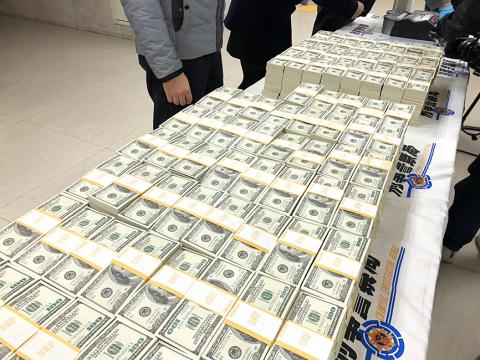The Criminal Investigation Bureau (CIB) and the New Taipei City District Prosecutors’ Office yesterday announced that they had broken up a counterfeiting ring, detained five suspects and seized forged US currency which had reportedly fooled some local banks.
Raids carried out over the past month had seized a total of US$11.04 million in counterfeit US$100 bills, making it one of the largest forgery cases in the nation’s history, CIB investigator Hsu Chao-pin (徐釗斌) said.
The forged notes were of high quality, with the smaller detectors used in some local banks indicating they were authentic, although the bills could not trick larger, standard detectors, CIB Forensic Examination Division head Yeh Chia-yu (葉家瑜) said.

Photo: Chiu Chun-fu, Taipei Times
Because of the sophisticated printing and engraving technology used, the bureau invited a US Secret Service specialist in counterfeit money to travel to Taiwan from Hong Kong to examine the forged notes, Yeh said.
The examination showed that the seized banknotes were from the same batch as money seized in a 2006 case where a Taipei branch of Mega Bank (兆豐銀行) lost NT$66 million (US$2.16 million at the current exchange rate) due to forged US$100 bills, Yeh said.
Nine people had been arrested and tried for the 2006 counterfeit operation, but prosecutors would not rule out that the two cases are related, with those detained over the past month also having been involved in the earlier case.
Last night, a judge ruled that a man surnamed Liao (廖), 64, the apparent leader of the counterfeit ring, as well as a man surnamed Chueh (闕), 58, and three other suspects should remain in detention due to the seriousness of the crime, as well as the risk they would flee the country, collude and tamper with the evidence, Hsu said.
Prosecutors said the suspects could be charged with counterfeiting valuable securities under the Criminal Code.
After receiving tip-offs, investigators put the group under surveillance and tracked their movements over six months, before conducting four raids over the past month, detaining suspects in Taipei, New Taipei City’s Sanchong District (三重), Taoyuan and Changhua County.
Besides the fake US$100 bills, the raids also netted a batch of fake US dollar straps — bands for holding a single denomination of notes together — along with the engraving ink used, but Hsu said that they did not find the engraving molds or printing presses.
Liao produced the bills and passed them on to Chueh, who allegedly sold the forged bills to friends at local markets for NT$350 to NT$450 each, investigators said, adding that Chueh told the buyers that the bills would pass for the real thing at currency exchange oulets in foreign nations.
Chueh told the buyers that it was best to spend or exchange the bills at casinos, gambling dens, hotels and entertainment clubs in Southeast Asian nations, investigators said.

PREPAREDNESS: Given the difficulty of importing ammunition during wartime, the Ministry of National Defense said it would prioritize ‘coproduction’ partnerships A newly formed unit of the Marine Corps tasked with land-based security operations has recently replaced its aging, domestically produced rifles with more advanced, US-made M4A1 rifles, a source said yesterday. The unnamed source familiar with the matter said the First Security Battalion of the Marine Corps’ Air Defense and Base Guard Group has replaced its older T65K2 rifles, which have been in service since the late 1980s, with the newly received M4A1s. The source did not say exactly when the upgrade took place or how many M4A1s were issued to the battalion. The confirmation came after Chinese-language media reported

The Taiwanese passport ranked 33rd in a global listing of passports by convenience this month, rising three places from last month’s ranking, but matching its position in January last year. The Henley Passport Index, an international ranking of passports by the number of designations its holder can travel to without a visa, showed that the Taiwan passport enables holders to travel to 139 countries and territories without a visa. Singapore’s passport was ranked the most powerful with visa-free access to 192 destinations out of 227, according to the index published on Tuesday by UK-based migration investment consultancy firm Henley and Partners. Japan’s and

A Ministry of Foreign Affairs official yesterday said that a delegation that visited China for an APEC meeting did not receive any kind of treatment that downgraded Taiwan’s sovereignty. Department of International Organizations Director-General Jonathan Sun (孫儉元) said that he and a group of ministry officials visited Shenzhen, China, to attend the APEC Informal Senior Officials’ Meeting last month. The trip went “smoothly and safely” for all Taiwanese delegates, as the Chinese side arranged the trip in accordance with long-standing practices, Sun said at the ministry’s weekly briefing. The Taiwanese group did not encounter any political suppression, he said. Sun made the remarks when

BROAD AGREEMENT: The two are nearing a trade deal to reduce Taiwan’s tariff to 15% and a commitment for TSMC to build five more fabs, a ‘New York Times’ report said Taiwan and the US have reached a broad consensus on a trade deal, the Executive Yuan’s Office of Trade Negotiations said yesterday, after a report said that Washington is set to reduce Taiwan’s tariff rate to 15 percent. The New York Times on Monday reported that the two nations are nearing a trade deal to reduce Taiwan’s tariff rate to 15 percent and commit Taiwan Semiconductor Manufacturing Co (TSMC, 台積電) to building at least five more facilities in the US. “The agreement, which has been under negotiation for months, is being legally scrubbed and could be announced this month,” the paper said,